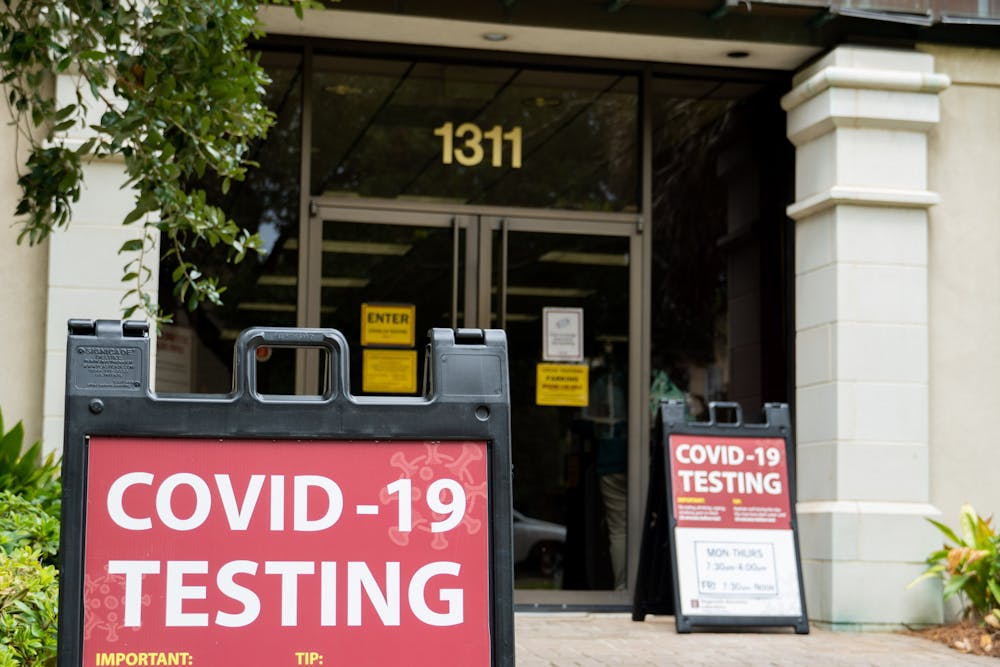Some COVID-19 protocols are being rolled back from last semester as the pandemic enters its third year. Now, the university is beginning to look to respond to the new threat of monkeypox as the case count increases.
Surges in COVID-19 cases are expected following move-in, but unlike in previous years, return-to-campus testing will not be required, according to university spokesperson Jeff Stensland and Interim Associate Vice President of Student Health and Well-Being Dr. Jason Stacy.
Students, faculty and staff no longer have to test every month, but according to Stensland voluntary testing will still be available. COVID-19 testing will take place at 1311 Pendleton St instead of the Coliseum. The university will not be publishing a COVID-19 dashboard of active cases due to the effort it took to produce it and low viewership when the information is also available on the CDC website. Lastly, they will not be conducting wastewater testing, according to Stacy.
"We've asked our students to plan ahead and anticipate if they do test positive, we want them to have a plan for how they are going to execute a plan to isolate," Stacy said. "If someone has special circumstances, they can contact the Ombuds office because we no longer have access to the NAC. So only special circumstances, we're using in the Ombuds office to execute some of our emergency housing."
The Ombuds office helps students with unforeseen circumstances that may impact their experience at the university. The National Advocacy Center (NAC) is a government building located near Gambrell and Close-Hipp that offered quarantine housing for students who couldn't go home.
Now, housing will only be provided under special circumstances because of the lost access to the NAC, and emergency housing space is much more limited.
Should monkeypox reach campus, the university will respond in partnership with the South Carolina Department of Health and Environmental Control (DHEC). The current plan for controlling a potential spread is to use contact tracing to prevent it from reaching campus at all, Stacy said. According to Stensland, There are currently no reported cases of monkeypox on campus.
If needed, testing for monkeypox can be offered on campus, Stacey said.
Stacy said the university is working on training health services to be able to test for monkeypox through DHEC and LabCorp, but also suggests if a student suspects they may have monkeypox, they should also visit an emergency room or urgent care. University Health Services is currently referring all questions regarding monkeypox testing and treatment to DHEC and CDC.

“With this virus being an emerging pathogen, we're still at a phase where we can hopefully control it by utilizing the steps that DHEC can help us utilize, like contact tracing,” Stacy said. “They do a thing called ring vaccination where they basically find close contacts to an individual who's been infected and find anybody who's been in their proximity and try and get them vaccinated.”
Vaccines for monkeypox are currently in short supply all over the world and are currently only given out in about eight different locations across South Carolina. Because of this, they are not going to be offered on campus in the foreseeable future, according to Stacy. However, vaccines through DHEC are available, just not through the university.
DHEC's guidelines currently are to provide vaccines for those at an increased risk, including men who have sex with men who have had an STI or multiple sex partners in the last 90 days.
“I don’t know exactly how they’re going to help us handle that. We will respond how we need to, but again, because this is an emerging pathogen … let the experts in infectious disease and experts in epidemiology help guide us,” Stacy said.
Former interim university President with a background in epidemiology, Dr. Harris Pastides held the position while the COVID-19 pandemic persisted and advised new leadership to communicate with other leaders and with students.
"Admit when you're not sure about something. Have current and state-of-the-art expertise, and understand the competing dynamics,” Pastides said.
Pastides also encouraged working against the stigma that may be held by students against those who wear a mask.
"I would ask the students not to ridicule or stereotype people as being a lunatic because they're wearing a mask. This mask matter on the faculty side to respect students because they're not, it's not conclusive that a mask is everything. So I think we have to be more tolerant, more respectful of each other,” Pastides said.
The university's current plan is to keep the campus open, Stensland said.
“I’ve seen a couple of people on Twitter say, ‘Well are you going to shut down campus like with COVID," Stensland said. "I think it is important to point out that they are very different and that what was effective for COVID may not be where you follow the exact same playbook. And I think we could be safe to say we have no plans of shutting down campus for monkeypox.”
For students who may have lost concern for the COVID-19 pandemic, with a new one coming along, it is important to continue to keep others safe by following safety recommendations, according to Stacey.
"I guess, if anything, really, just if you're not really worried about yourself, you should be worried about your friends, your family members, other people, you know, someone who may not have as strong of an immune system and so, try and keep yourself healthy so you don't get other people sick," Stacy said.

